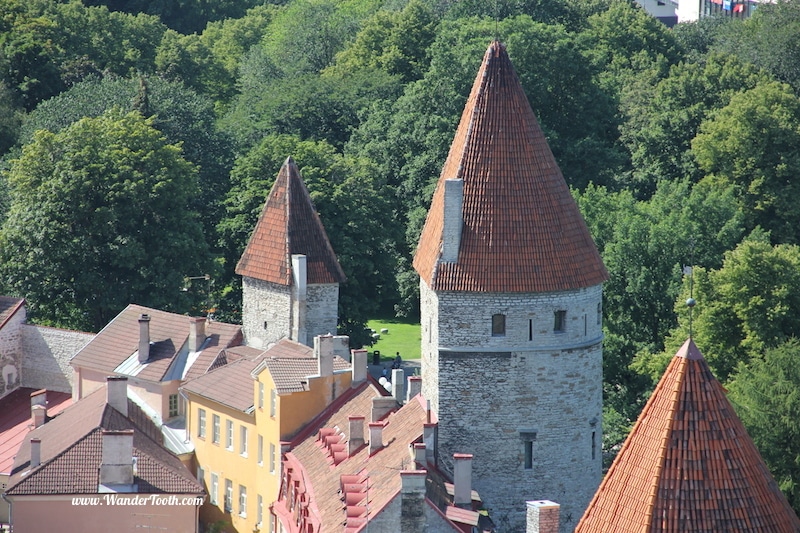Have you ever wondered about the history of marzipan?
Today I will introduce you to a magical wonderland, a place so magical and wonderful that IT INVENTED CANDY! Okay…it didn’t invent candy. One of its residents did. And also, not ALL candy. Just THE BEST KIND OF CANDY! To begin, it’s healthy: it’s made from almonds! So you can have your candy, and eat your omegas, too. What’s that you say? Marzipan isn’t healthy? To which I say, “hush now, you’ll disturb the woodland creatures…the delicious, delicious, woodland creatures.”

Today we’re talking Tallinn, Estonia, the home of marzipan…sort of, and only maybe sort of. Confused? Allow me to explain.
You are probably under the impression that, when the Iron Curtain fell, Estonia was engulfed in a lasting peace, and the Estonians lived happily ever after. That is totally false. In actual fact, Estonia has been fighting another war, an epic battle over who can lay claim to being the king of the marzipan candy, heir of the marzipan hog…

This ongoing and tragically under-publicized war is with Lübeck, Germany. Lübeck, as you may know, is kind of a big deal when it comes to marzipan: the Lübeck-based Niederegger confectionary has been making kittens out of almond paste since 1806. And silly old Tallin? They’ve only been making marzipan since…also 1806. Hmmm. Marzipan is first referenced in Lübeck in 1530, which is 108 years before after its first reference in Tallinn (1422). Double Hmmm. Which brings be back to a point I’ll be covering over the next few weeks, about how the Soviets were total A-holes: besides previously documented atrocities (like preventing the good Estonian people from brewing their own beer), being behind the Iron Curtain for all those years kind of screwed Estonia in terms of becoming the European capital of marzipan, or at least sharing the title with Lübeck.

European capital, you ask? Why the modifier? Here’s the thing: Marzipan actually came from neither Estonia nor Germany. Nope. Just another classic case of Europeans taking credit for something that was ALREADY DISCOVERED (see: Christopher Columbus, Ferdinand Magellan, and many, many others). We actually have the Middle East (Persia) to thank for the sweet concoction. Because I’m a huge nerd, I did a LexisNexis search and found a few newspaper articles tracing the likely etymology of marzipan to one of three sources: mawtaban, an Arabic word meaning “king on a throne;” mazaban, which was the name of the boxes used to transport almonds back in the 1200s; or Maci panis, meaning St. Mark’s Bread. This last option is probably the least likely, but it has the best story: In the early 15th century, a deep freeze hit Venice, threatening the city’s residents with starvation. A baker found some almonds and sugar and combined them to make marzipan “bread,” thus saving the city from the ravages of the winter.
So what’s the moral of this story, besides “winter’s coming: stockpile candy?” There really isn’t one, other than you should really go visit Tallinn, because not only is it pretty awesome, but you’ll get to stuff your face with healthy candy.

Have you been to Tallinn? Did you stuff your face with Marzipan? Send or tweet me a picture!
Note: I would love to link to the original articles I used as sources for this post, but they’re only available behind paywalls. Because nobody likes copyright infringement, I’ve listed them here:
Boyes, R. (2005). Gatecrasher from next door spoils the marzipan party. The Times (London). December 22, 2005.
Lawrence, S. (2001). Festive feast or folly? The Times (London). December 15, 2001.
Harriman, S. (1995). Sink your teeth into Lubeck, city of marzipan and medieval spires. The Virginian-Pilot (Norfolk). July 30, 1995.

I love marzipan! But I think there is a category of people strongly hating it. I mean … not disliking, but hating! :)
Thanks for the comment! I think you’re right – there are a lot of marzipan haters out there! I don’t understand what’s not to like about powdered sugar and almond paste, mixed together as a cute little creature!
Intriguing.. thank goodness for your nerdy research and the true creators of marzipan get their long overdue credit.
Ha ha! Thanks Tracey!
good marzipan is my favourite. I just bought speculoos cake filled with marzipan, the only problem with that is, I can’t stop eating it!
Oh yum – sounds delicious!
I have been to Tallinn several times, it’s 9 hours away from Vilnius, where I live. It’s indeed true that they claim to have had marzipan before Lubeck. It used to be prescribed as medicine and could be bought in pharmacies. I used Tallinn Card whicj entitles a holder a gift from Kalev sweet shop-a free marzipan candy, and a tea/coffee in the nearby cafe.
Great tip, Ele! We didn’t get the Tallinn card, but we did eat some marzipan!
Pingback: The History of the Christmas Tree: Another Secret European War - WanderTooth
I never knew about this war with Tallinn… that makes me feel a little guilty for the post I just wrote extolling Lübeck marzipan! Maybe I’ll have to edit in a mention of Estonia somewhere! Do the Estonians also have the German tradition of giving marzipan pigs for New Year’s?
Ha ha…no need to feel guilty. I think Germany has won the publicity side of the battle, as most people seem to accept that marzipan comes from Germany. And yet…
Not too sure about the Christmas tradition thing – we were there in the summer. In either case, I’m glad this little war hasn’t developed beyond a war of words…for now :)
stop spread disinfo about soviets
and now russians.
jesus christ it’s like they are the new jews of the world
the new scapegoats
everyone blame russia for everything
putin caused brexit
putin cause your kitten to die
russia caused you to lose your tooth yesterday
good grief.